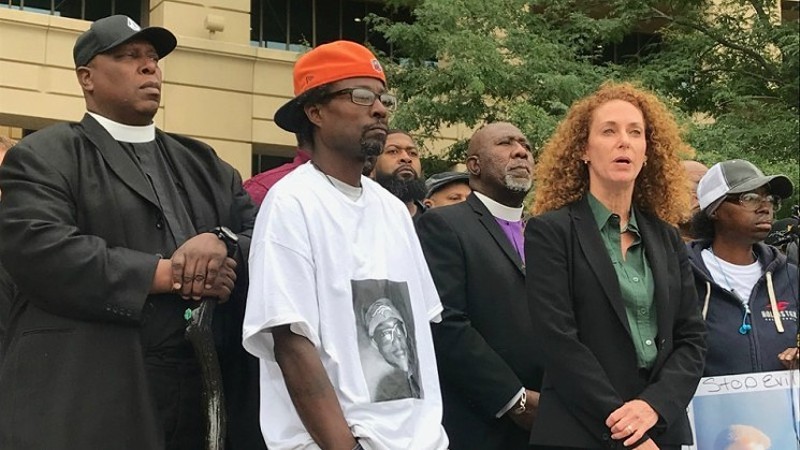"It's a nice PR campaign," Newman acknowledges. "But actions speak louder than words — and Aurora's words aren't consistent with its actions. What we see is case after case after case after case where Aurora continues to deny accountability for its obvious racist and brutal misconduct."
Even as the police department is publicly pledging to clean up its act, she points out, the City of Aurora continues to argue in court that officers did nothing wrong in the McClain case, as seen in a document filed a week before the unveiling of "A New Way." Moreover, one of that plan's central tenets — diversifying department personnel — was part of a 2007 settlement in the fatal shooting of another unarmed Black man four years earlier. "It's been over a dozen years since they either broke their promise, or it's made no difference because the culture of the department is so fundamentally racist," Newman points out.
Newman's concerns don't end with the police department. She recently added Mayor Mike Coffman as a defendant in a lawsuit related to the APD's actions during a violin vigil honoring McClain. In a letter to Aurora's city attorney, Newman explained that Coffman is accused of threatening to displace two of the suit's plaintiffs from a community task force unless they remove their names from the suit.
Newman isn't entirely dismissive of the department's efforts to change. She's particularly heartened by a policy ending no-knock raids, calling it "an outstanding first step that is likely to save lives." Likewise, she praises the department for firing Officer Levi Huffine over his startling behavior toward a woman named Shataeah Kelly, which was captured on video. "This officer drove for about twenty minutes with Shataeah Kelly upside down on her head in the back seat of his car, begging for him to stop because she was afraid she was going to suffocate to death," notes Newman. She represents Kelly, too, and future litigation over the issue is likely.
But Newman sees a basic disconnect between Aurora's public posture and its assertion in a scheduling document related to the McClain lawsuit. In it, "they say they didn't use excessive force against Elijah," she points out. "They say they didn't deny him equal protection of the law that then caused his death, and they give a supposedly factual recitation of why they think everything they did was justified. They deny all the allegations in the complaint, they claim the defendants were justified in stopping Elijah and that they were justified in using a carotid hold on him, and they claim they're entitled to qualified immunity, which is basically a legal get-out-of-jail-free card. So on the one hand, they say they're committed to a new way of operating and a new level of accountability, but they won't take accountability for the wrongs they've already committed."
One such wrong was the 2003 killing of Jamaal Bonner. Here's how the ACLU of Colorado describes that incident:
"Aurora police officers shot and killed Jamaal Bonner during a prostitution sting. When an Aurora SWAT team burst into his hotel room and Mr. Bonner didn't take his hand out of his pocket quickly enough, an Aurora officer tased him. While Mr. Bonner lay on the floor unarmed, an officer shot him three times in the back, killing him." The ACLU added that "none of the officers involved in this unconstitutional use of excessive force was ever disciplined," but Aurora "paid $610,000 to settle the family's legal claims."
In that 2007 settlement, Aurora also agreed to take the following steps toward department diversification:
A. Continue to engage in recruitment activities at colleges, including city campuses and two year colleges, and to encourage law enforcement careers through the use of the APD Explorer program and other contacts with high schools;In the introduction for "A New Way," Aurora Police Chief Vanessa Wilson states: "We are committed to not only a more diverse police department that is reflective of the people of Aurora, but also a more racially equitable, bias-free and culturally competent agency that is responsive to the residents we serve." And the plan itself specifically goals of creating a "more diverse leadership team" and "changes to Civil Service role in hiring and discipline in pursuit of a department that better mirrors the demographics of our diverse city."
B. Continue recruitment activities through publication in periodicals targeted at communities of color;
C. Discuss with the Police Chief the creation/reinstitution of voluntary peer support groups for minority and female recruits and officers;
D. Continue to encourage minority and female officers to participate in recruitment activities;
E. Revise all recruitment materials to accurately reflect the civil service educational requirements for entry-level applicants;
F. Continue to distribute recruitment materials reflective of the diversity of the citizenry of Aurora;
G. Continue to emphasize the lateral transfer program with departments with higher concentrations of officers of color; and
H. Continue to work with community-based groups and organizations in communities of color to support APD recruitment activities.
"We've seen these promises before," Newman says, referencing the Bonner settlement.
And then there's what Newman sees as retaliation against Lindsay Minter and Pastor Thomas Mayes, plaintiffs in the violin-vigil lawsuit. In "A New Way," she explains, "Aurora claims it wants an increased role for civilians and community voices. But both Pastor Mayes and Lindsay Minter are members of Aurora's community task force on the police, and the Mayor of Aurora [Coffman] called and threatened to remove them from the task force if they didn't drop out of the lawsuit."
In response, she continues, "we sent a letter to the city attorney's office saying it was First Amendment retaliation for him to issue those threats. And now we've amended our complaint in the protest lawsuit, bringing a specific claim against Mike Coffman individually for First Amendment retaliation."
As Newman sees it, the APD is "such a profoundly troubled department that I question whether reform is possible. These platitudes about a new way of operating, a new way of engagement, a new way of accountability are fine aspirations as far as they go. But the problems with the Aurora Police Department run so deep and have persisted over so many decades that it's hard to imagine that these generalized platitudes are going to truly make a difference, particularly when we've seen Aurora's failure to live up to similar promises in the past."
Click to read the scheduling order for Estate of Elijah McClain, et al., v. City of Aurora, et al., the amended complaint in the case of Lindsay Minter, et al., v. City of Aurora, et al., and the letter to Aurora's city attorney related to the Minter lawsuit.













